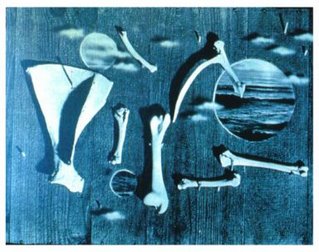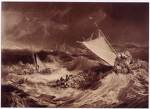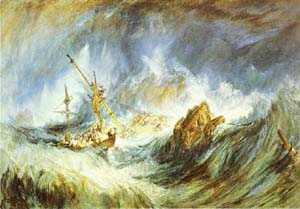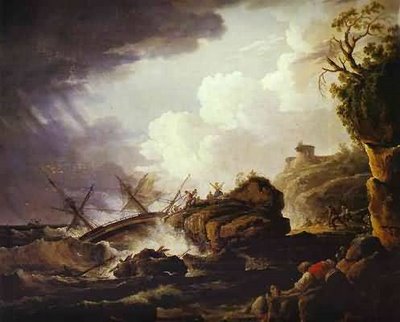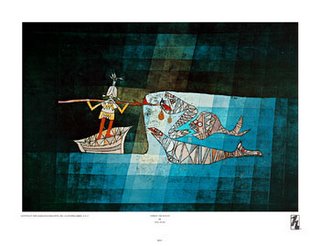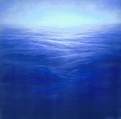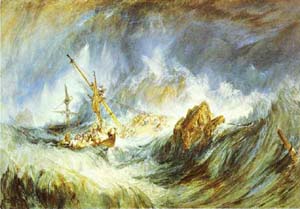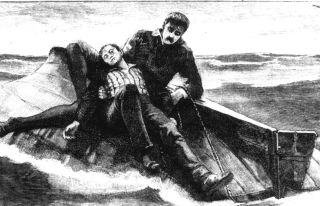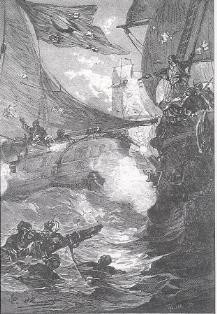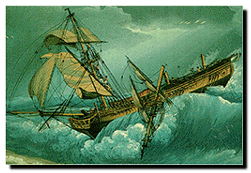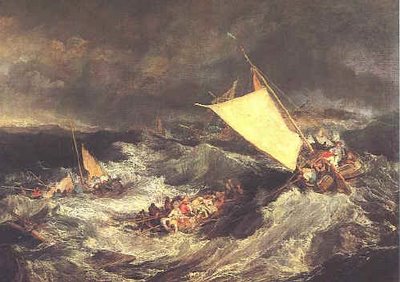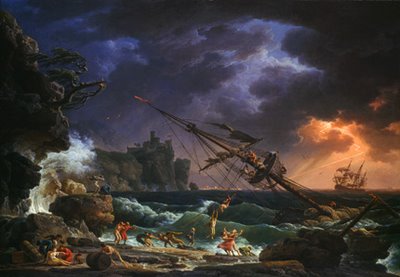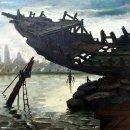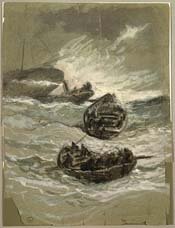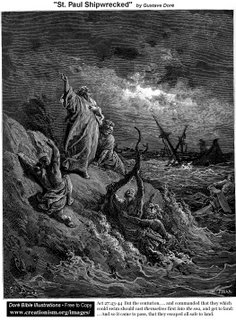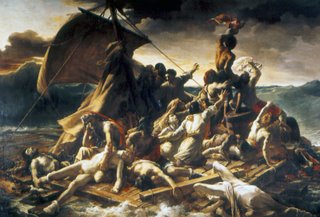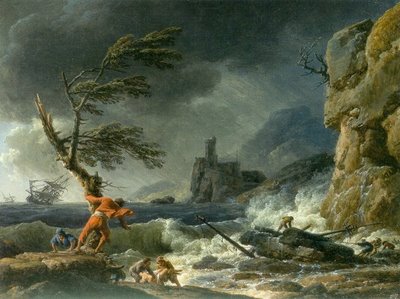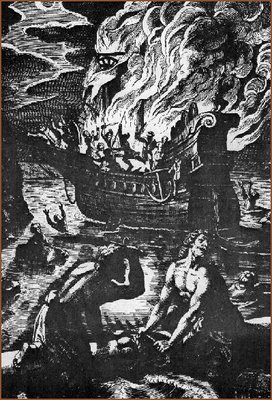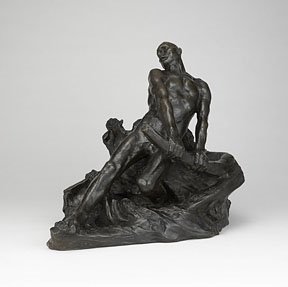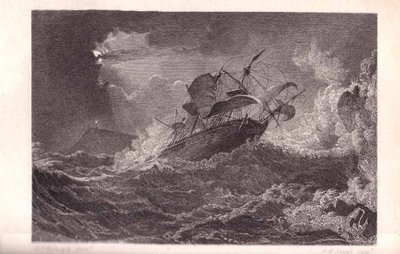“I think I’d rather be a beachcomber”, I thought, picturing a long desert stretch of sand and nothingness huddling by the sea like a spent lover, lazily soaking in the sun, its back to a sparse pine forest. My mind was just flitting towards a small wooden shack of undefined colour, with a broad porch, a ragged hammock motionless in one extreme, pebbles, and seashells and derelict wood - softened by the waves and bleached by the sun- cast about with deliberate carelessness...
“Stop drivelling” rasped a voice in my ear, wrenching me away from the seaside as O’Farrell’s smug, overweighed bookshelves fuzzily came into view again. Row after row of leather-bound volumes, fastidiously classified and neatly placed, giving the impression of a vast and solid learning, the illusion of having an answer to every question, the solution for every client’s problem.
I realised that I had inadvertently spoken out loud. “For Christ’s sake, what wrong with you man?” -again the voice- with a hint of puzzled impatience. “This could mean a big leap in your career! Are you sure you’re okay?” “Excuse me”, I mumbled, “I’ve been a bit stressed out... I’m fine... really...and thanks again, I appreciate your support”. “Get down there, set up the Trust and be back on Friday to celebrate. The Firm has a big stake in this, and I’m counting on you. You know some of my associates don’t think the world of you after that conflict of interests in the Capriati Case, they find you unreliable. Anyway, don’t let me down!”. The interview was over, O’Farrell had his mind on a brief that waited on his large oak desk, so I let myself out of the office, picked up my plane tickets at his secretary’s desk (“Have a nice trip” she said perfunctorily, while talking on the ‘phone) and pushed through the meandering aisles and boxes of O’Farrell, Milton, Meinhaus and Mills’ Law firm.
I’m walking along the seaside now. My feet have become hardened by the sand, the salt in the air tickles my nose, its paths criss-cross over my tightened skin, my hair stands on end effortlessly. A persistent breeze, such as sailors pray for, skims over the waves carrying the distant thunder of tempests, of galleons cracking like nutshells, of cannon-fire. I sense the silent movement of dark grey predators lunging and the slow, steady expansion of pale red coral.
London is an evanescent memory, an uneasy dream, stark and intense in the middle of the night - suddenly waking, heated, bilious, trembling-, slowly fading, unreal, incongruous in the sunlight.
It took some time before daylight imposed it’s realm. At first it was all quite painful. Perhaps the initial surprise, the shock, was bearable, almost comic, when you attained a certain perspective. But, offence, was much harder to take. The sense of disappointment weighed on me. I had always cherished other people’s trust, thinking it made me feel worthy. Of course I never really acknowledged how it rapidly became tension in my back and neck, how my stomach seemed to close up and obsessive thoughts of failure pursued me. That was no one’s fault but my own. The inherent laziness which seduces us away from our better selves, the distraction of trivialities and nonsense, a weakness not to be allowed or forgiven.
One day a young promise, the willing bearer of other people’s hopes, even dreams, the next I was Judas, Quisling, one who put his own (and, naturally, unacceptable) concerns above all else, biting the hand that fed him, spitting on everything once held dear. And, what for? Something incomprehensible, indecorous, foolish, perhaps even obscene, like some pathetic old man in a porn theatre, shuffling up to young boys around the toilets.
The tide rises slowly and licks at my feet. A maroon sail cuts across the skyline, heading out into the faraway blue, as waves spray out white at the schooner’s hull; a curious dolphin, a hungry cormorant, my mind follows behind, lost between sky and water.
I suppose there is something unholy about straying from the established path, an unforgivable insolence that others receive as a slap in the face. The cause of such unnatural behaviour had to be found in some uncondonable character trait. Naturally, there is always a generous roster of sins and vices to which deviant behaviour can be attributed. In such circumstances, all poetic references to “distant drums” are rapidly extinguished in the purifying flames of outrage and rejection.
I come upon a large chunk of driftwood embedded in the sand. A family of spidery crabs scrabbles beneath it, and warily spy outwards. Two seagulls screech at each other over a morsel of fish. It falls to the sea as they battle and curse. The log offers me the comfort of its smooth sides, I gently let myself down and lean my shoulders on it, my head falls backwards filling my eyes with gold gilded clouds and a deep, fathomless sky. The sun goes down majestically in a sea of liquid fire.
I completed my mission in the Bahamas with the same speed and disgust with which you cross murky, pee-ridden alleys in big cities, faintly sensing menacing shapes in the dark and creatures moving around in the garbage. My mind was seldom there, and it was obvious by the bewildered and progressively impatient stares I met when emerging from some inopportune reverie, that I was hardly causing a favourable impression on my hosts and clients. However, I was so relieved to get through each day without any serious mishap, that by the second rum punch at the hotel’s Bar & Grill, it was all almost forgotten. At some point I’d crawl off to bed and, thankfully, a very persistent clerk made sure I finally got up the following morning.
Night has overtaken me, there is a soft chill, the wind races the waves and triumphantly leaps over the beach into the forest. My rest piece seems to have become harder, I discover parts of my back I never knew existed, I wonder why knowledge is so often painful, but... no time for that... those stars, up there, falling out of the black velvet sky need to be watched, revered, drunk down thirstily in wide unblinking eyefuls, even at the risk of inebriation. I can’t seem to weary of them, though at times the unbearable deepness of the night sky refuses to pacify the soul, and the planets shoot through your body like lightning, twitching muscles, dizzying, too vast, too bright, too far away. Then, there is no option but to seek refuge in some low ceiling tavern, drowning in the sounds of drinking and laughter, their awful, silent roar.
Laura appeared on my doorstep a cloudy afternoon about a fortnight after I’d announced I was staying. She looked as fresh and bright as usual, though her eye rims were redder and her smile faltered. I just stood there, not knowing whether to hug her or dive out the window. “Please... come in, come in” I stammered looking hopelessly around, throwing some clothes off a chair and beckoned her to sit. She surveyed the dingy, furnished cabin I was renting, with all the reserve she could command, while I busied myself making coffee. I felt her eyes boring through me while my back was turned, but somehow we managed to postpone looking at each other directly, until I finally sat down in front of her with the most undrinkable coffee I’d ever made. “So... how are you?” she asked almost in a whisper.
I am mesmerised by the sea. Perhaps it is natural, being an islander; but this is not the sea of my early youth, which seemed to batter the proud castle walls of the coast of Devon like an endless invading horde. Nor is it an accident to be conquered, a battlefield of empires. I see it now as a continuum of this piece of land on which I sit, as radically different in its dark wildness, its fierce joy, as all that lies beyond rational thought. Another world, barely touching ours, speaking to us in it’s own language, seeing into our depths, in ways we cannot conceive. It’s ebb and flow are life itself, expanding and contracting eternally, the core remaining aloof, untouched by even the mightiest forces of nature.
As I sit here, motionless, awed… the sea runs through me... these eyes -suddenly turquoise- pierce the bottomless abyss, my coral bones reach out to the thin sunlight filtering past the waves, seaweed flows from my head.
I loved Laura with the violent, uneasy tenderness of an undeserved reward. Once, as a child, pushing my way through the brush and thistles of the moors, I came upon a wild pony. Breathlessly advancing one foot after the next, I made my way gradually towards it, praying it would stay, and, though snorting and stamping, it continued feeding, eyeing me warily from the side. I dreaded the idea of a sudden flight, yet, a curious calm came over me, a sort of uncertain tension seemed to bind us, a sense of brotherhood. Perhaps it was just the sun, building bridges of light, toying with reflections, perhaps that weighty warmth of summer afternoons that slows all motion, rooting us briefly to the ground. We breathed in unison and unknown voices from our depths seemed to speak to each other. I was by its side, it’s nostrils flared as I reverently caressed its sleek flank, afraid that the beating of my heart would scare it away. I felt that I could have mounted and ridden all day and all night into the moors, away from everything. The thought frightened me, and as my mind strayed, the pony softly nudged me with its muzzle and trotted away.
And I knew then, and often felt thereafter, however hard I tried to bury the feeling, that some essential flaw of mine, a kind of spiritual handicap, would always come between me and the multifold magic that I intuited life kept hidden among its many treasures. Some essential part of Laura was always as far away from me as that wild pony’s thoughts.
The grey water is becoming alive with colours, ripples pick up pinks and violets from the early morning sky, deep greens open and close like mouths, farther, speckles of gold and silver are tossed around on blue-green waves. My heart opens up to encompass them, a rainbow nestles behind my eyes.
Laura left silently. We could not bridge the sea that had unveiled between us. That night we made love with a soft desperateness and, as on those rare occasions when all our masks had fallen away, she giggled... and then wept, reverberating slowly, as if some hidden chord had been touched. We fell asleep clinging to each other, and when I awoke, she was gone.
It is twilight, a dull, fading red marks the spot where the sun was swallowed by the ocean, the surf whooshes, a lone sea-gull cries... and I cannot help wondering over and over, why we must betray others to avoid betraying ourselves… why this poignant, undefined longing…. why the sea...
 Attilio Canale
Attilio Canale